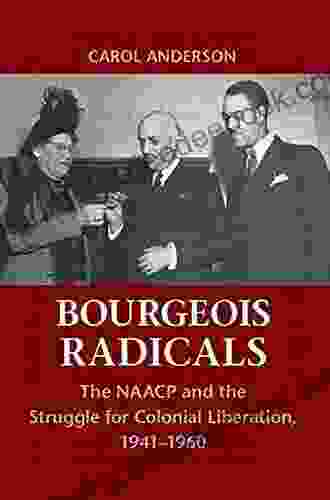The NAACP and the Struggle for Colonial Liberation, 1941-1960: A Movement for Independence and Civil Rights

The National Association for the Advancement of Colored People (NAACP) played a pivotal role in the struggle for colonial liberation in the mid-20th century. From 1941 to 1960, the organization actively supported anti-imperialist movements in Africa, Asia, and the Caribbean, advocating for the end of colonialism and the promotion of human rights. This article explores the NAACP's involvement in the colonial liberation movement, examining its motivations, strategies, and impact.
Motivations for Involvement
The NAACP's involvement in colonial liberation was rooted in its long-standing commitment to civil rights and social justice. The organization recognized that colonialism was a form of racial oppression that denied millions of people their fundamental rights and freedoms. NAACP leaders believed that the struggle for racial equality in the United States was inherently linked to the fight for liberation and self-determination in colonized territories.
4.9 out of 5
| Language | : | English |
| File size | : | 8223 KB |
| Text-to-Speech | : | Enabled |
| Enhanced typesetting | : | Enabled |
| Word Wise | : | Enabled |
| Print length | : | 384 pages |
| Screen Reader | : | Supported |
Moreover, the NAACP saw colonialism as a threat to global peace and security. The exploitation and oppression of colonial subjects created conditions of instability and resentment, which could lead to conflict and violence. The organization believed that it was in the best interests of the United States and the world to support the dismantling of colonial empires and the establishment of independent, democratic nations.
Strategies for Support
The NAACP pursued a range of strategies to support colonial liberation movements. One of its most effective methods was lobbying the U.S. government to adopt policies that promoted decolonization. The organization urged the government to support the United Nations Declaration on Human Rights, which condemned all forms of colonialism and promoted the right to self-determination.
The NAACP also worked closely with anti-colonial organizations in the United States and abroad. It provided financial assistance, legal support, and publicity to these groups, helping them to mobilize their supporters and advance their cause. The organization also organized conferences and events to raise awareness about the issue of colonialism and to build support for liberation movements.
Specific Campaigns
The NAACP's involvement in colonial liberation was particularly evident in specific campaigns and initiatives. In 1941, the organization endorsed the Atlantic Charter, a declaration by the United States and Great Britain that affirmed the right of all peoples to self-government and economic self-determination. The NAACP also supported the United Nations Charter, which included provisions calling for the end of colonialism and the promotion of human rights.
During the 1950s, the NAACP played a key role in the movement for African independence. The organization supported the efforts of Kwame Nkrumah in Ghana, Jomo Kenyatta in Kenya, and Patrice Lumumba in the Congo to lead their countries to independence. The NAACP also condemned the apartheid regime in South Africa and supported the anti-apartheid movement led by Nelson Mandela and others.
Impact and Legacy
The NAACP's involvement in the colonial liberation movement had a significant impact on the course of history. The organization's advocacy contributed to the growing international consensus against colonialism and helped to raise awareness about the issue in the United States. The NAACP's support for anti-colonial movements strengthened their position and provided them with a platform to voice their demands on a global stage.
The legacy of the NAACP's colonial liberation work continues to resonate today. The organization's commitment to anti-imperialism and human rights has inspired other social justice movements around the world. Its efforts helped to lay the foundation for the global movement for decolonization and the establishment of independent, democratic nations in Africa, Asia, and the Caribbean.
The NAACP's involvement in the struggle for colonial liberation was a vital chapter in the organization's history. Motivated by its commitment to civil rights and social justice, the NAACP worked tirelessly to support anti-imperialist movements around the world. Its strategies for support included lobbying the U.S. government, providing assistance to anti-colonial organizations, and organizing events to raise awareness about the issue. The NAACP's impact on the colonial liberation movement was significant, contributing to the growing international consensus against colonialism and helping to strengthen the position of anti-colonial movements on a global stage. The legacy of the NAACP's colonial liberation work continues to inspire social justice movements around the world today.
4.9 out of 5
| Language | : | English |
| File size | : | 8223 KB |
| Text-to-Speech | : | Enabled |
| Enhanced typesetting | : | Enabled |
| Word Wise | : | Enabled |
| Print length | : | 384 pages |
| Screen Reader | : | Supported |
Do you want to contribute by writing guest posts on this blog?
Please contact us and send us a resume of previous articles that you have written.
 Novel
Novel Chapter
Chapter Text
Text Genre
Genre Reader
Reader Paperback
Paperback E-book
E-book Newspaper
Newspaper Bookmark
Bookmark Shelf
Shelf Bibliography
Bibliography Preface
Preface Synopsis
Synopsis Scroll
Scroll Codex
Codex Tome
Tome Bestseller
Bestseller Classics
Classics Narrative
Narrative Memoir
Memoir Reference
Reference Encyclopedia
Encyclopedia Dictionary
Dictionary Thesaurus
Thesaurus Narrator
Narrator Character
Character Resolution
Resolution Librarian
Librarian Stacks
Stacks Periodicals
Periodicals Research
Research Lending
Lending Reading Room
Reading Room Rare Books
Rare Books Special Collections
Special Collections Literacy
Literacy Thesis
Thesis Awards
Awards Book Club
Book Club Theory
Theory Tom Barker
Tom Barker Indiana Ellington
Indiana Ellington Teresa Palomo Acosta
Teresa Palomo Acosta Caimh Mcdonnell
Caimh Mcdonnell Andy Burnham
Andy Burnham Philip Staniford
Philip Staniford Patrick Collier
Patrick Collier Vlad Tarko
Vlad Tarko Mary Oldham
Mary Oldham Jan Erik Solem
Jan Erik Solem Sussan England
Sussan England Sean Taylor
Sean Taylor Okayado
Okayado David White
David White Gary Clark
Gary Clark Hasbro
Hasbro Daniel Wendler
Daniel Wendler Robert Boyers
Robert Boyers C Hallman
C Hallman Roxane Cerda
Roxane Cerda
Light bulbAdvertise smarter! Our strategic ad space ensures maximum exposure. Reserve your spot today!

 Raymond ChandlerMemoir of My Life in Music with Personal Stories About Leonard Bernstein,...
Raymond ChandlerMemoir of My Life in Music with Personal Stories About Leonard Bernstein,... Cameron ReedFollow ·11k
Cameron ReedFollow ·11k Christian CarterFollow ·7.9k
Christian CarterFollow ·7.9k Elmer PowellFollow ·12.2k
Elmer PowellFollow ·12.2k Jay SimmonsFollow ·3.7k
Jay SimmonsFollow ·3.7k Theodore MitchellFollow ·18.7k
Theodore MitchellFollow ·18.7k Andrew BellFollow ·10.2k
Andrew BellFollow ·10.2k Cade SimmonsFollow ·17.9k
Cade SimmonsFollow ·17.9k John ParkerFollow ·12.5k
John ParkerFollow ·12.5k

 Franklin Bell
Franklin BellSecond Edition Pdf No Audio: A Comprehensive Guide to the...
The Second Edition...

 Jackson Blair
Jackson BlairTrends and Issues in Instructional Design and Technology
Instructional...

 Mario Vargas Llosa
Mario Vargas LlosaEnchanting Enigma Variations and Triumphant Pomp and...
The Enigma Variations: A...

 Dwight Blair
Dwight BlairTime Between Us: A Novel That Explores the Power of...
Prepare to be swept away by...
4.9 out of 5
| Language | : | English |
| File size | : | 8223 KB |
| Text-to-Speech | : | Enabled |
| Enhanced typesetting | : | Enabled |
| Word Wise | : | Enabled |
| Print length | : | 384 pages |
| Screen Reader | : | Supported |














